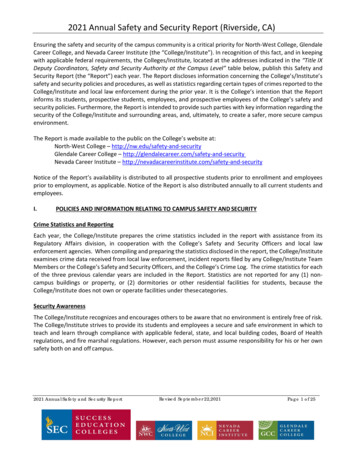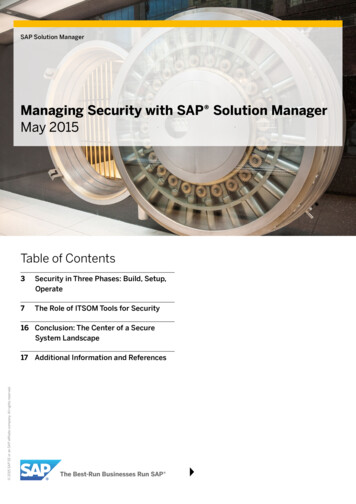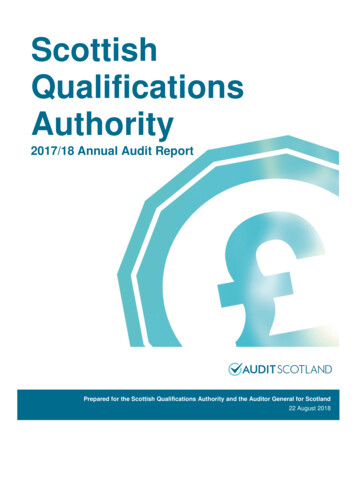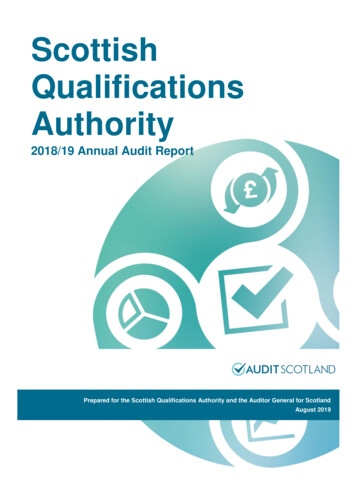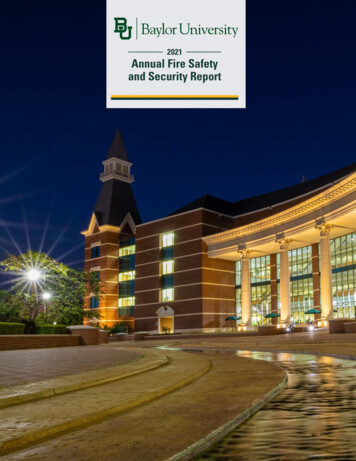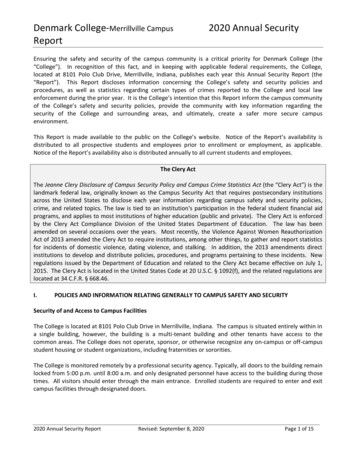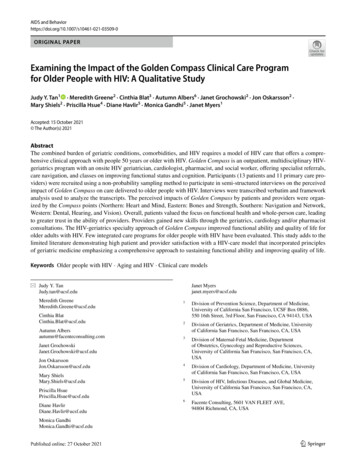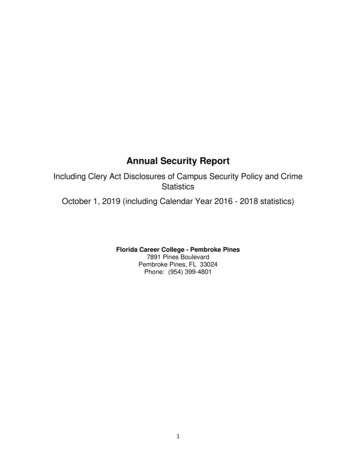
Transcription
Annual Security ReportIncluding Clery Act Disclosures of Campus Security Policy and CrimeStatisticsOctober 1, 2019 (including Calendar Year 2016 - 2018 statistics)Florida Career College - Pembroke Pines7891 Pines BoulevardPembroke Pines, FL 33024Phone: (954) 399-48011
The Jeanne Clery Disclosure of Campus Security Policy and CampusCrime Statistics ActThe Jeanne Clery Act Disclosure of Campus Security Policy and Campus CrimeStatistics Act (“Clery Act”) is a Federal Law that requires colleges and universities to: Publish and distribute an Annual Security Report (“Report”) by October 1st that containsthe three prior calendar years’ crime statistics and certain Florida Career Collegesecurity policy statements;Inform all active students and employees, as well as prospective students andemployees, about the existence of the Annual Security Report and how to access it onthe internet or request a paper copy;Disclose crime statistics for the Florida Career College campus, public property areasimmediately adjacent to or accessible from the school, and any non-campus facilities orremote classrooms. The statistics must be gathered from a number of resources,including local law enforcement, school security officers, and other school officials whohave “significant responsibility for student and school activities” including designatedCampus Security Authorities;Provide “timely warning” notices and/or “emergency notifications” of crimes that haveoccurred which pose an ongoing threat to the Campus Community.On March 7, 2013, the Violence Against Women Reauthorization Act of 2013 (VAWA) (PublicLaw 113-14) was signed into law. VAWA includes amendments to the Clery Act. These changesrequire institutions to disclose statistics, policies and programs related to dating violence,domestic violence, sexual assault and stalking, among other changes. Specifically, thesechanges added or modified requirements related to: Disclosure of statistics of the number of dating violence, domestic violence, sexualassault and stalking incidents; Disclosure of statistics of new categories of Hate Crimes; Implementation by institutions and disclosure of programs to prevent dating violence,domestic violence, sexual assault and stalking, including primary prevention and awarenessprograms for incoming students and employees; and ongoing prevention and awarenesscampaigns for students and employees; Disclosure of procedures victims should follow if a crime of dating violence, domesticviolence, sexual assault or stalking has occurred; and Implementation by institutions and disclosure of procedures for institutional disciplinaryaction in cases of dating violence, domestic violence, sexual assault and stalking, includingdescriptions of each disciplinary proceeding used by the institution; the standard of evidenceused during each disciplinary proceeding; possible sanctions imposed following the resultsof disciplinary proceedings; the range of protective measures that the institution may offer avictim; provisions to ensure that proceedings will be prompt, fair and impartial; provisionsthat state that proceedings will be conducted by officials who receive annual training; andensuring equal opportunities for the accuser and accused to have others present duringproceedings, including an advisor of their choice.2
Security Policies & Procedures(October 1, 2019)IntroductionFlorida Career College is strongly committed to crime prevention and the safety of our CampusCommunity. Although we have been fortunate in not experiencing a serious problem at ourschools, the school is potentially subject to many of the same problems that occur in any urbanarea of the country. The following information has been prepared to increase awareness of thecurrent programs and procedures that exist to protect the safety and well-being of our students,employees, and guests.The Campus Community is defined as all active students, faculty, and staff.As members of the Campus Community, you are encouraged to take personal responsibility foryour conduct and safety. Adopting a posture of individual responsibility will enhance the qualityof life for all students. The cooperation and involvement of all members of the CampusCommunity in crime prevention programs sponsored by the institution and by reporting allsuspected criminal actions and emergencies is essential to minimize criminal activity.The institution believes that a well-informed Campus Community helps create a safetyconscious public which is more important today than ever before. Pursuant to the requirementsset forth by the Clery Act, the institution will publish and distribute an Annual Security Report byOctober 1st of each year, to include the crime statistics for reported crimes over the previousthree calendar years.Preparation and Distribution of the Annual Security ReportThe Campus Security Authority (CSA), with the assistance of the Corporate ComplianceDepartment, is responsible for facilitating preparation, and ensuring the distribution, of thisReport to the Campus Community. The Campus President/Executive Director serves as a CSAand is responsible for preparing and distributing the Report, and soliciting and obtaining crimereports from the CSAs and local police throughout the year for collection of the annual crimereport statistics used in this Report.No later than October 1st of each year, the Campus Community is provided the AnnualInformation Notification literature announcing that the updated Annual Security Report isavailable on the Florida Career College’s internet website. This notification contains a direct linkto the Annual Security Report. Additionally upon request, the Annual Security Report isavailable in paper copy.We encourage all members of the Campus Community to use this Report as a guide for safepractices on campus and off campus. A hard copy of the Report can be obtained by visiting theFlorida Career College Education Department/Admissions Department. This Report is alsoavailable on the internet at the following location: r-info3
The institution distributes a notification of the availability and the internet location of this Reportto all enrolled students and current employees via electronic mail and handout notifications,stating that the current version of the Report has been posted to the Institution’s website andthat a paper copy of the Report will be provided upon request by contacting the EducationDepartment/Admissions Department. The Education Department/Admissions Departmentprovides written notice to all prospective students prior to enrollment regarding the availabilityand location of the Report. The Annual Security Report with the crime statistics are available onthe Unify portal for employees. The Human Resources Department provides all prospectiveemployees with information regarding the availability and location of the Report. All prospectiveemployees may receive a copy of the Report by contacting the CSA at the campus. In addition,a copy of the current Report is made available to the public on the Institution’s website. Thecrime statistics contained in this Report, as reported annually to the U.S. Secretary ofEducation, can also be viewed by searching the Institution’s name athttp://nces.ed.gov/collegenavigator/.Campus Security AuthoritiesThe Clery Act defines a Campus Security Authority (CSA) as any school official that has asignificant responsibility for students and/or school activities. The Act requires the school toidentify the school officials that fall into this category and will be responsible for reporting anycrimes of which they are made aware which have been reported in good faith.The Institution has designated the school’s Campus President/Executive Director as theCSA. A secondary CSA is the Director of Education, Associate Director of Education or otherdesignate.Upon observing or involvement in any type of crime or criminal offence on campus or on publicproperty, including thoroughfares, streets, sidewalks, and parking facilities, within the campus orimmediately adjacent to or accessible from the campus: A member of the Campus Community should immediately notify a CSA at the contactinformation listed below. If the CSAs are not available, then the student should notify anycampus level employee.Members of the Campus Community should report any criminal offense to one of the followingCSAs for purposes of issuing a notification or timely warning to the entire Campus Community,where necessary, and for inclusion of the information in the school’s Clery Act annual crimestatistics disclosure.The contact information for the CSAs below is also located in the school catalog supplement forthis institution. The school catalog along with this supplement is located on the institution’swebsite along with the school catalog. This supplement is updated quarterly.TitlePhoneCampus President(954) 399-4825Director of Education(954) 399-48044
A CSA who receives a report of a sexual offense (dating violence, domestic violence, sexualassault and stalking), will also notify the Florida Career College Title IX Coordinator for furtheraction under the Florida Career College’s Title IX policy. The Title IX Coordinator has primaryauthority for investigating sex offenses. A copy of the Florida Career College Title IX policy andTitle IX grievance procedure is contained in the school catalog.The Title IX Coordinator contact information:Title IX CoordinatorDirector of Human ResourcesInternational Education Corporation16485 Laguna Canyon Rd Ste. 300Irvine, CA 92618(949) 812-7706TitleIXCoordinator@ieccolleges.comCampus PoliceFlorida Career College does not have a campus police department or employ campus police.Florida Career College’s personnel have no authority to arrest or detain any individual. FloridaCareer College has no memoranda of understanding (MOU) or any other type of writtenagreement with any law enforcement agencies for the investigation of alleged criminal offenses.Florida Career College will assist in notifying appropriate law enforcement authorities if astudent requests assistance in contacting police. Members of the Campus Community areencouraged to accurately and promptly report all crimes and public safety related incidents to aCSA. Members of the Campus Community should contact the emergency authorities directly ifan immediate emergency situation exists.Clery Geography:For the purposes of collecting statistics for submission to the Department and inclusion in aninstitution’s annual security report, Clery geography includes: Buildings and property that are part of the institution’s campus; Public property within or immediately adjacent to and accessible from the campus; and Non-campus buildings or property that the institution owns or controls.On-Campus: Any building or property owned or controlled by an institution within the samereasonably contiguous geographic area and used by the institution in direct support of,or in a manner related to, the institution’s educational purposes.Public property: All public property, including thoroughfares, streets, sidewalks, and parking facilities,that is within the campus, or immediately adjacent to and accessible from the campus.Non-campus PropertyThe institution does not have any Non-campus Property.5
Off-Campus Organizations and Residential HousingFlorida Career College does not have any off-campus student organizations recognized by theinstitution or any residential housing.Reporting Criminal Activities and EmergenciesFlorida Career College encourages Members of the Campus Community to report all criminalactivities and emergencies that have occurred at the school. If the victim of a crime “is unable”to report a crime, members of the campus community are encouraged to report crimes of whichthey are aware.Emergencies: In emergency situations occurring on campus, in any public areas immediatelyadjacent to or accessible from the school, or any non-campus facilities or remote classroomlocations, requiring the response of fire, police, or medical assistance, first dial 9-1-1.Thereafter, contact one of Florida Career College’s designated CSAs.Non-emergencies: In a non-emergency criminal offense situation occurring on campus, in anypublic areas immediately adjacent to or accessible from the school, or any non-campus facilitiesor remote classroom locations, report the incident to one of the school’s designated CSAs.Voluntary and Confidential ReportingVoluntary Reporting and Confidentiality: Reports about crimes and sex offenses do not haveto be formal signed complaints. Information may be provided in confidence to a CSA and/orTitle IX Coordinator. He/she will make every attempt to maintain privacy in accordance withFERPA regulations unless required by law to disclose the victim’s identity to protect the safetyof others. Florida Career College will maintain as confidential any accommodations or protectivemeasures provided to the victim, to the extent that maintaining such confidentiality would notimpair the ability of the institution to provide the accommodations and protective measures. Thevictim will be informed if the institution cannot maintain the requested confidentiality of theinformation. The institution does not have pastoral or professional counselors. Therefore, theinstitution does not have confidential reporting procedures that encourage pastoral andprofessional counselors, if and when they deem it appropriate, to inform the persons they arecounseling of any procedures to report crimes on a voluntary, confidential basis for inclusion inthe annual disclosure of crime statistics. The institution encourages and will provide assistance,if needed, to victims of crimes or offenses to seek out these counseling services.Florida Career College strongly encourages persons who are victims of a sex offense or thatwitness a sex offense to report the incident to a CSA voluntarily and on a confidential basis topermit the inclusion of that information in the Institution’s annual crime statistics. The institutionis required to, and will, keep the identity of victims of sexual violence private in any public reportof Clery Act crimes, including this Report. Policies with respect to victims of sex offenses arecontained in the Title IX Complaint/Grievance Policy in the school catalog.Timely Warning PolicyIn the event that a report of a crime that occurs, either on or off campus, that, in the judgment ofthe CSA constitutes an ongoing or continuing threat to the safety of the Campus Community , acampus wide “timely warning” will be issued. The warning will be issued through a text messageand/or the Institution’s e-mail system to the Campus Community and, if deemed appropriate,6
through additional intercom or verbal announcements, flyers or other means.Anyone with information about a crime warranting a timely warning should report thecircumstances to a CSA by phone or email (contact information noted in previous pages of thisReport) or in person at the campus office.Emergency Notification & Evacuation ProceduresThe Institution has Emergency Notification and Evacuation procedures for alerting the CampusCommunity about significant emergencies or dangerous situations. These emergencynotification procedures will be used whenever there is an immediate threat to the health orsafety of members of the Campus Community.The Institution is responsible for developing contingency plans and continuity of operationsplans for the staff and areas of responsibility in the event of an emergency. The Institutionconducts annual emergency response exercises, such as field exercises and tests of theemergency notification systems on campus. These tests are designed to assess and evaluatethe emergency plans and capabilities of the institution. When a serious incident occurs thatcauses an immediate threat to the campus, the first responders to the scene are usually thelocal police, ambulance or fire departments and they typically respond and work together tomanage the incident. Depending on the nature of the incident, other local or federal agenciescould also be involved in responding to the incident.All members of the Campus Community are notified on an annual basis that they are required tonotify the CSAs of any situation or incident on campus that involves a significant emergency ordangerous situation that may involve an immediate or ongoing threat to the health and safety ofthe Campus Community. The CSAs have the responsibility of responding to, and summoningthe necessary resources, to mitigate, investigate, and document any situation that may cause asignificant emergency or dangerous situation. The CSAs have the responsibility to respond tosuch incidents to determine if the situation does in fact, pose a threat to the Campus Communitysuch that an emergency notification and or Timely Warning or other notification must be issued.If the CSA(s) confirms that there is an emergency or dangerous situation that poses animmediate threat to the health or safety of some or all members of the Campus Community, theCSA and other Florida Career College employees, as appropriate, will collaborate to determinethe content of the message and will use some or all of the systems described below tocommunicate the threat to the Campus Community or to the appropriate segment of thecommunity, if the threat is limited to a particular building or segment of the population. The CSAwill, without delay and taking into account the safety of the community, determine the contentof the notification and initiate the notification system, unless issuing a notification will, in thejudgment of the first responders compromise the efforts to assist a victim or to contain, respondto, or otherwise mitigate the emergency.The CSA(s) will confirm the emergency or dangerous situation by witnessing the situation,communicating with another Florida Career College official who has witnessed the situation orsomehow verify that an emergency exists. The appropriate segment of the community is definedas the entire Campus Community. The CSA will determine the content of the notification byobtaining enough information about the emergency situation so that the person receiving thenotification will have enough timely information to understand the situation and what action totake and will initiate the notification system by an appropriate means determined by the severityof the significant emergency or dangerous situation.7
The Institution will disseminate the emergency to the larger community by notifying the localEmergency services of the dangerous situation on the campus and the Institution will rely uponthe emergency officials to use their professional judgment in regards to notifying the neighboringcommunity outside of the institution.In the event of a serious incident that poses an immediate threat to members of the CampusCommunity, the institution has various systems in place for communicating information quickly.Some or all of these methods of communication may be activated in the event of an immediatethreat to the Campus Community. These methods of communication may include activation ofthe fire alarm system, an email and/or text message sent to the Campus Community and apublic announcement system (or megaphone) as applicable.Any bomb threat, fire alarm, or notification by emergency services automatically constitutes athreat sufficient to activate the institution’s evacuation procedures. In addition, any other threatthat could result in bodily harm and could affect any portion of the employees or students mayconstitute a threat sufficient to activate the evacuation procedures. Upon notification of theneed to evacuate, all students, faculty, and staff, should exit their rooms and the building,quickly but orderly, and follow the Emergency Exit guidelines to the predetermined outsideareas to wait for further information. The CSAs or their designees will inform the CampusCommunity when it is okay to reenter the building.During instances of the need to lock-down the school (i.e., Tornado or Active Shooter),employees and students should take cover immediately and wait to be told everything is clear. Ifan incident occurs and the buildings or areas around you become unstable, or if the air outdoorsbecomes dangerous due to toxic or irritating substances, it is usually safer to stay indoors,because leaving the area may expose you to that danger. Thus, to "shelter-in-place" means tomake a shelter of the building that you are in until it is safe to go outside.The institution’s evacuation procedure and testing methods are designed to ensure the safety ofeveryone on campus. Tests will be conducted annually and evaluated for effectiveness; thesecould include: drills, exercises and follow-through activities. An evacuation drill is coordinated bythe CSAs for all buildings housing classrooms. During these drills, students learn the locationsof the emergency exits in the buildings and are provided guidance about the direction theyshould travel when exiting each facility for a short-term building evacuation. During these drills,CSAs will staff the scene and will communicate information to students regarding the developingsituation or any evacuation status changes.The institution's procedures to test the emergency response and evacuation procedures on anannual basis, include:1) Drills that may be announced or unannounced;2) Publicizing its emergency response and evacuation procedures in conjunction with atleast one test per calendar year (Example: Post in a public area the schoolsevacuation or lockdown procedures); and3) Documenting, for each drill, a description of the exercise, the date, time, and whetherit was announced or unannounced.The purpose of evacuation drills is to prepare building occupants for an organized evacuation incase of an emergency. At the institution, evacuation drills are used as a way to educate and8
train occupants on issues specific to their building. During the drill, occupants 'practice' drillprocedures and familiarize themselves with the location of exits and the sound of the fire alarm.In addition to educating the occupants of each building about the evacuation procedures duringthe drills, the process also may provide the institution an opportunity to test for the properoperation of fire alarm system components. Evacuation drills are monitored by the CSA.Students receive information about evacuation and shelter-in-place procedures duringeducational sessions that they participate in throughout the year.Responding to Reports of Criminal Activity and EmergenciesA CSA and the local city police department, when necessary, will respond to and investigateeach report of criminal activity. Appropriate steps will be taken to notify the victim of theoutcome of the investigation and any “Administrative Actions” taken.Administrative Actions: If a reported criminal offense involves a student or employee as thealleged offender, the offender will be subject to applicable Florida Career College conductpolicies and disciplinary procedures. Sanctions or Disciplinary Actions may include suspensionor expulsion for student offenders and termination of employment for employee offenders.The local city fire department will respond to all reports of fire or medical emergencies oncampus.Access Policy, Security of Campus Facilities, And Security Considerations Used in theMaintenance of Campus FacilitiesThe institution does not maintain campus residential facilities. Campus Buildings are open tostaff, faculty and/or students during business hours, Monday-Friday and evenings andweekends during which classes are conducted. During non-business hours access to CampusBuildings is by key via a designated staff member for the purpose of approved staff use,maintenance or cleaning.Reports are prepared by participating departments which identify deficient equipment so thatrepairs can be made immediately. Recommendations for improvements are also submitted tothe appropriate departments/offices for consideration.Crime Awareness & Prevention ProgramThe institution is committed to creating and maintaining a community in which students, faculty,and staff can work and study in an atmosphere free of criminal activities.The institution has established a Crime Awareness & Prevention Program that communicatesinformation regarding campus security procedures and practices and crime preventionmeasures with all new students that is provided upon enrollment and with new employees at thebeginning of their employment. The Crime Awareness & Prevention Program is designed toprovide information about campus security procedures and policies and to encourage studentsand employees to be responsible for their own security and the security of others. Examples ofhow the institution provides information to students and employees are through the CampusSafety website where there are printable informational brochures and campus safetypresentations.9
Should time be of the essence regarding security awareness, information may be released tothe Campus Community through the timely warning procedures contained in this Report.Protecting yourself from being a victim of a crimeA significant part of crime prevention is individual safety consciousness and awareness of one’spersonal environment. These simple measures can contribute to the safety and security of theCampus Community: Lock your car.Never leave valuable items visible in your car including personal and school relatedmaterials such as textbooks.Dress appropriately and in compliance with school dress codeTake and keep your car keys with you at all times.At night, travel in well-lighted areas, and in pairs, if possible. Avoid shortcuts anddeserted areas.Leave items of high monetary value at home.Do not leave personal property unattended in classrooms, labs, or in the studentlounge.Do not carry more cash than necessary and never advertise what you have. Ifanything makes you feel unsafe or threatened, call a CSA or dial 9-1-1.How we work to protect youThe CSA will use the Timely Warning Policy advising the Campus Community when there hasbeen a crime or series of crimes that poses a threat to the safety and welfare of the CampusCommunity.The institution’s goal is to provide an environment that is as safe and secure as possible. Thefacility is open to the public during normal business hours, Monday-Friday and evenings andweekends during which classes are conducted. After business hours access to CampusBuildings is available only by key at the designated student entrance for the purpose ofapproved staff use, maintenance or cleaning. Classrooms and offices not in use are locked.Florida Career College is committed to ensuring that the facilities are kept in good repair,including doors and locking mechanisms. In addition, exterior lighting is an important part ofFlorida Career College’s commitment to safety. Employees and staff are encouraged to reportany known problems or hazards to a CSA. Prompt reporting enhances the institution’s safetyfor all.Sexual Offense Awareness & PreventionThe institution is committed to creating and maintaining a community in which students, faculty,and staff can work and study in an atmosphere free of all forms of harassment, exploitation, orintimidation. This includes steps to prevent sexual violence, including dating violence, domesticviolence, sexual assault and stalking, as required by the Violence Against WomenReauthorization Act of 2013 (“VAWA”).The institution prohibits the crimes of dating violence, domestic violence, sexual assault andstalking as they are defined for purposes of the Clery Act.10
Reporting Sexual Offenses ViolenceUpon observing or involvement in any type of sexual harassment or sexual violence, includingdating violence, domestic violence, sexual assault or stalking (“sex offense”) on campus or onpublic property, including thoroughfares, streets, sidewalks, and parking facilities, within thecampus or immediately adjacent to or accessible from the campus, members of the CampusCommunity should report the incident to the CSA and/or the Title IX Coordinator. An incidentcan be reported to the CSA and/or the Title IX Coordinator in person, by phone, by email oranother appropriate means. Where there is any question about whether an incident constitutessexual violence, a report should be made to the CSA or Title IX Coordinator for assistance indetermining the nature of the incident. A CSA who receives a report of a sexual offense (datingviolence, domestic violence, sexual assault and stalking), will notify the Florida Career CollegeTitle IX Coordinator for further action under the Florida Career College’s Title IX policy andprocedures as contained in the school catalog. The Title IX Coordinator has primary authorityfor investigating sex offenses. A Title IX Coordinator who receives a sex offense report willnotify the CSA for purposes of maintaining accurate Clery Act crime statistics.If you are a victim of a reported sex offense, the Title IX Coordinator, CSA or designee will meetwith you privately. He/she will act thoughtfully without prejudging or blaming you.You will be treated with courtesy, sensitivity, dignity and understanding.He/she will accommodate your request to speak to a law enforcement officer of thesame gender.They he/she will help in arranging hospital and/or counseling services or otherassistanceWe may change your academic situations after an alleged sex offense if you request itand the changes are reasonable and available. Please see the Title IXComplaint/Grievance Procedure Policy in the school catalog for additional information.You and the accused (if also a student or employee) will have the same opportunities tohave others present during a disciplinary meeting and both of you will be informed of thefinal results and actions taken against the accused. Please see the Title IXComplaint/Grievance Pr
Florida Career College - Pembroke Pines 7891 Pines Boulevard Pembroke Pines, FL 33024 Phone: (954) 399-4801 . 2 The Jeanne Clery Disclosure of Campus Security Policy and Campus Crime Statistics Act The Jeanne Clery Act Disclosure of Campus Security Policy and Campus Crime Statistics Act ("Clery Act") is a Federal Law that requires colleges .

